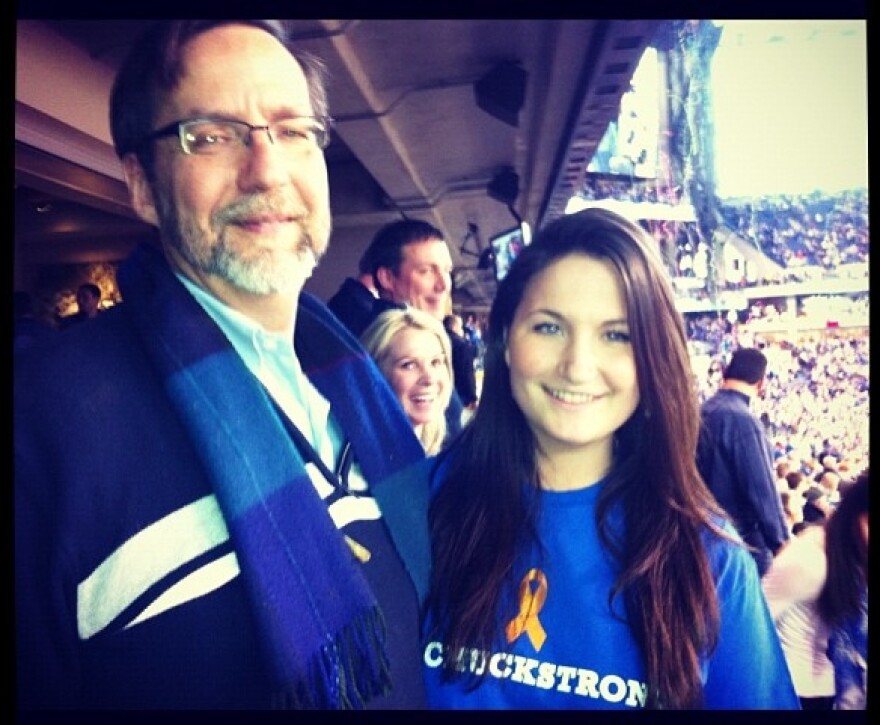As an oncologist and palliative care specialist, Larry Cripe treats critically ill patients. Two years ago, he found himself on the other side of the healthcare system after his college-aged daughter suffered a 30-foot fall. In this series of essays, Dr. Cripe shares what he learned about how better to communicate with the critically ill and their families, and how to move forward in the face of an uncertain future.
***
Two years ago my daughter Millicent was in Washington DC when she tripped and fell over a stair railing and struck her head on the concrete floor thirty feet below. She was rushed to a nearby trauma center unconscious and intubated. When the police called, my wife, Mimi was in their hotel room waiting for Millicent to return. I was at home in Indianapolis. When I got into my car I knew two things. She was alive. And I was a good ten hours away.
I was not surprised. It is commonplace to hear people describe the loss of speech in the first hours following a tragedy.
For most of the day, I’d driven silently over roads slick with newly fallen snow. Conversations with my wife were few and brief; there was little new information as she waited for the various test results. I refused to say certain words like ‘coma’ or ‘fall’ aloud. I needed to pretend that I was driving to DC for a different reason. And finally I feared that my voice would crack and betray my helplessness.
Now, I can tell the story of my struggle to recover my speech. I want to reflect on on the words my daughter’s physicians chose and the ways in which they spoke those words to my wife and me. I believe the doctors were well-intentioned. But instead of being reassured, I felt disabled.
I now realize the words they chose often had multiple different meanings. Take the word ‘recovery.’ In the first fifteen hours I learned that recovery meant: Millicent would not die; Millicent would eventually return to college, or Millicent might one day live independently with assistance. Few of her many physicians clarified what was meant when they spoke the word. No one offered what to look for as we waited. And no one came close to asking what the word meant to us.
Later, as we made arrangements to bring Millicent home by air ambulance, my wife and I discovered that we each had latched onto different meanings of the word recovery. And on some level we were preparing for different futures. The multiple, un-clarified meanings created a space where we spoke without necessarily understanding one another.
And then there were the incomplete sentences. The pattern was predictable. A physician would, in a clear distinct voice, inform us about a test result. But as the conversation veered away from the information itself, to what the information might mean, his voice became less distinct, his sentences incomplete.
One physician offered to show us the MRI of Millicent’s brain. He was so definite as he explained the source of all the distressing abnormalities on the scan and how research had clarified their cause. But when asked whether the extent of injury would help us understand what we might expect, his sentences trailed off into an indecipherable mumble.
The early hours and days of Millicent’s injury were like facing a series of doors. I did not expect to know what was behind each door, but I wanted someone to tell me what might be there.
I know how heartless certain words sound when spoken early in a tragedy. But what I needed from Millicent’s physicians were the words to regain my speech so that I could be an effective advocate for my daughter who had sustained a traumatic brain injury. Of course, I wanted to know everything would be all right. But more importantly I wanted to know that if it wasn’t going to be all right I could muster the resources to make the best out of a horrible situation.
Perhaps I expected too much. Several times in my life, before Millicent’s fall, I had been the physician who met the parents of a critically ill college student when they first arrived from out of town. I now understand that their silence was the sound of bewilderment and helplessness. I now believe the words I speak are to provide the words people need to begin preparing for the future.
Larry Cripe, MD is a Hematologist and Oncologist Specializing in Palliative Care at Indiana University Hospital in Indianapolis, and a contributor to Sound Medicine.




